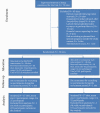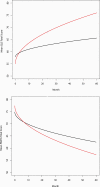Outcomes During and After Early Intervention Services for First-Episode Psychosis: Results Over 5 Years From the RAISE-ETP Site-Randomized Trial
- PMID: 35689478
- PMCID: PMC9434430
- DOI: 10.1093/schbul/sbac053
Outcomes During and After Early Intervention Services for First-Episode Psychosis: Results Over 5 Years From the RAISE-ETP Site-Randomized Trial
Abstract
To examine long-term effects of early intervention services (EIS) for first-episode psychosis, we compared Heinrichs-Carpenter Quality of Life (QLS) and Positive and Negative Syndrome Scale (PANSS) scores and inpatient hospitalization days over 5 years with data from the site-randomized RAISE-ETP trial that compared the EIS NAVIGATE (17 sites; 223 participants) and community care (CC) (17 sites; 181 participants). Inclusion criteria were: age 15-40 years; DSM-IV diagnoses of schizophrenia, schizoaffective disorder, schizophreniform disorder, brief psychotic disorder, or psychotic disorder not otherwise specified; first psychotic episode; antipsychotic medication taken for ≤6 months. NAVIGATE-randomized participants could receive NAVIGATE from their study entry date until NAVIGATE ended when the last-enrolled NAVIGATE participant completed 2 years of treatment. Assessments occurred every 6 months. 61% of participants had assessments conducted ≥2 years; 31% at 5 years. Median follow-up length was CC 30 months and NAVIGATE 38 months. Primary analyses assumed data were not-missing-at-random (NMAR); sensitivity analyses assumed data were missing-at-random (MAR). MAR analyses found no significant treatment-by-time interactions for QLS or PANSS. NMAR analyses revealed that NAVIGATE was associated with a 13.14 (95%CI:6.92,19.37) unit QLS and 7.73 (95%CI:2.98,12.47) unit PANSS better improvement and 2.53 (95%CI:0.59,4.47) fewer inpatient days than CC (all comparisons significant). QLS and PANSS effect sizes were 0.856 and 0.70. NAVIGATE opportunity length (mean 33.8 (SD = 5.1) months) was not associated (P = .72) with QLS outcome; duration of untreated psychosis did not moderate (P = .32) differential QLS outcome. While conclusions are limited by the low rate of five-year follow-up, the data support long-term benefit of NAVIGATE compared to community care.
Keywords: coordinated specialty care; early intervention services; first episode psychosis; follow-up; schizophrenia.
© The Author(s) 2022. Published by Oxford University Press on behalf of the Maryland Psychiatric Research Center. All rights reserved. For permissions, please email: journals.permissions@oup.com.
Figures
Similar articles
-
Psychopharmacological Treatment in the RAISE-ETP Study: Outcomes of a Manual and Computer Decision Support System Based Intervention.Am J Psychiatry. 2018 Feb 1;175(2):169-179. doi: 10.1176/appi.ajp.2017.16080919. Epub 2017 Sep 15. Am J Psychiatry. 2018. PMID: 28945118 Free PMC article. Clinical Trial.
-
Randomised controlled trials of conventional antipsychotic versus new atypical drugs, and new atypical drugs versus clozapine, in people with schizophrenia responding poorly to, or intolerant of, current drug treatment.Health Technol Assess. 2006 May;10(17):iii-iv, ix-xi, 1-165. doi: 10.3310/hta10170. Health Technol Assess. 2006. PMID: 16707074 Clinical Trial.
-
Comprehensive Versus Usual Community Care for First-Episode Psychosis: 2-Year Outcomes From the NIMH RAISE Early Treatment Program.Am J Psychiatry. 2016 Apr 1;173(4):362-72. doi: 10.1176/appi.ajp.2015.15050632. Epub 2015 Oct 20. Am J Psychiatry. 2016. PMID: 26481174 Free PMC article. Clinical Trial.
-
Should we consider mood disturbance in schizophrenia as an important determinant of quality of life?J Clin Psychiatry. 1999;60 Suppl 5:23-9; discussion 30. J Clin Psychiatry. 1999. PMID: 10192404 Review.
-
Cognitive Behavioural Therapy for Psychosis: A Health Technology Assessment.Ont Health Technol Assess Ser. 2018 Oct 24;18(5):1-141. eCollection 2018. Ont Health Technol Assess Ser. 2018. PMID: 30443277 Free PMC article. Review.
Cited by
-
Disproportionate increase in cannabis use among people with serious psychological distress and associations with psychiatric service use in the United States, 2009-2019.Addict Behav. 2024 Oct;157:108095. doi: 10.1016/j.addbeh.2024.108095. Epub 2024 Jun 19. Addict Behav. 2024. PMID: 38905902
-
The problem of missing data for learning health systems focused on first-episode psychosis.Schizophr Res. 2025 May;279:79-86. doi: 10.1016/j.schres.2025.03.021. Epub 2025 Apr 2. Schizophr Res. 2025. PMID: 40174487
-
The EnTRy Program: Expanding Coordinated Specialty Care Beyond Early Psychosis.Community Ment Health J. 2025 Jul 7. doi: 10.1007/s10597-025-01491-8. Online ahead of print. Community Ment Health J. 2025. PMID: 40622668
-
Predictors of relapse and engagement in care one year after ending services in an urban safety net coordinated specialty care program for first episode psychosis.Schizophr Res. 2024 Feb;264:140-146. doi: 10.1016/j.schres.2023.12.022. Epub 2023 Dec 21. Schizophr Res. 2024. PMID: 38128345 Free PMC article.
-
Implementing Learning Health System Principles to Advance the Evaluation and Treatment of Clinical High-Risk for Psychosis.medRxiv [Preprint]. 2025 May 11:2025.05.09.25327345. doi: 10.1101/2025.05.09.25327345. medRxiv. 2025. PMID: 40385432 Free PMC article. Preprint.
References
-
- NIMH. Evidence-based treatments for first episode psychosis: components of coordinated specialty care. https://www.nimh.nih.gov/health/topics/schizophrenia/raise/evidence-base.... Accessed June 4, 2019.
-
- Gafoor R, Nitsch D, McCrone P, et al. . Effect of early intervention on 5-year outcome in non-affective psychosis. Br J Psychiatry. 2010;196(5):372–376. - PubMed
-
- Bertelsen M, Jeppesen P, Petersen L, et al. . Five-year follow-up of a randomized multicenter trial of intensive early intervention vs standard treatment for patients with a first episode of psychotic illness: the OPUS trial. Arch Gen Psychiatry. 2008;65(7):762–771. - PubMed
Publication types
MeSH terms
Substances
Grants and funding
LinkOut - more resources
Full Text Sources
Medical



